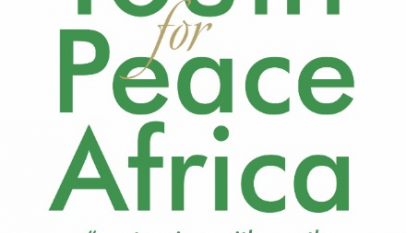“Religion should play the biggest role in attaining world peace”
Prince Henry Ezike is the Nigeria country representative of the Sant’Egidio community; an ecumenical movement working with the poor as well as building bridges of understanding among the followers of all the religions of the world. He speaks to African Newspage about the community’s activities in Nigeria including feeding program for homeless people and interfaith programs

What is the Sant’ Egidio community all about?
Sant’Egidio is an ecumenical movement that was founded in 1968 in Rome, Italy which is currently in over 80 countries of the world. It came into Nigeria in 2000 and we are all working as volunteers for the community and humanity in general. The community is known for four things which we called the four Ps; the first is prayers, the second is peace, the third is poor and the fourth is Ponte, which is an Italian word that means bridge: we are building bridges of understanding between cultures, religions and races.
And Ponte simply explains what the community is all about, it is a group of ordinary, young and old people that come together to pray, asking God to direct them on the best way to serve humanity and work for peace at the community, local and international level; between states and individuals. We work for the poor, like Pope Francis said; we are working for the periporous of the periphery, i.e the poorest of the poor. We are trying to bring them to the center of our lives. So, Ponte, which is about building bridges, entails our inter-religious, inter-racial and inter-cultural activities.
Services to the poor are one of your thematic areas of work, why are you feeding the poor?
It comes from the gospel, if you listen to the Gospel, Christ always said you should give to those who have nothing, and he said, in the judgment day you will be judged by among other things, when I don’t have food you give me something to eat; when I don’t have cloth, you give me cloth to wear, when I don’t have water you give me water to drink.
However, the community of Sant’Egidio is not just about giving out food and water to the poor but also about visiting prisons and so many other things which Christ asked us to do as Christians. So, what Sant’Egidio is doing is putting the gospel into practice. The tradition of the community is to organize feasts for the poor and destitute, widows and people living in the street; those who will not be able to invite us back.
Majority of the beneficiaries of your feeding and charity programs are non-Christians, why non-Christians?
When Christ said you should feed your neighbors he didn’t say those neighbors must be Christians and as far as our immediate community in Garki is concerned, our neighbors who are also poor are non-Christians and we will not leave them and go looking for poor Christians to feed. These are youth who are our neighbors that are hustling to survive and don’t really have something serious doing and knowing fully well how difficult it is for even those of us that are working to afford a decent meal we try to support them and augment the suffering in the land. We don’t care about what one’s religion is we just care about the poorest of the poor.
One of your major thematic areas of work is building bridges. How far have you gone in terms of building bridges of peaceful coexistence in Nigeria?
A lot of bridges, just take a look at our street feeding program whose beneficiaries are largely non-Christians but Muslims who having seen the friendliness we showed them wrote us a letter telling us that their biggest challenge was speaking English asking us to help them learn how to speak the language. They sent us a list of 20 people from Muhamamed to Usman, Yahaya and Bello and we accepted to organize for them to learn how to speak the English language and we are now working on modalities on how it will work.
We already have volunteers who can speak English and Hausa who are willing to teach them a common language that will benefit them even though they do not belong to our religion and ethnic groups, which is a practical example of building bridges. And we are organizing interreligious program which will bring together Muslims, Jews and followers of other religions to a round table since many of us believe in one God.
Your own way of worshiping God is different from ours but regardless of what you believe and practice we’ll still need to tolerate each other and coexist and the beauty of coexistence is it creates bridges of understanding. This year, to expand our work to the national level, we are organizing a program, where religious and traditional leaders will come together and talk about how we can coexist as brothers and sisters as well as enlighten people on living together.
At the international level, the community of Sant’ Egidio is known for our peace work, for example back in 1992 we mediated between the government of Mozambique and the rebels which led to the signing of a peace accord in October 1992 and ever since there has been peace in the country. The community has also worked in many other African countries including in South Sudan, Ivory Coast, and Central African Republic, to bring about peace. We are now working to bring succor to the people of Aleppo, in Syria, which is predominantly Muslim, and even some of them that are Christians are orthodox Christians and not Catholics like us in Sant’ Egidio.
What role do you religion can play towards attaining world peace?
I think religion has the biggest role to play in attaining world peace. I believe what unites people more than any other thing else is religion irrespective of whether or not one believes in God and whether it is in America, Africa or in Europe. So, you find people who are even atheists coming together whether or not they are from the same country, if they don’t have a common factor they won’t come together.
When a Christian from Nigeria sees a Christian from Ivory Coast they feel they are the same. When a Muslim from Nigeria meets a Muslim from Afghanistan they also feel they are the same. So, people automatically get attracted to one another according to their religious beliefs, unlike ethnicity which doesn’t have much influence over people’s life. So, religion is very important and having find out that people have so much love for their religion and so they tend to agree and disagree with one another along religious lines one can say religion has an important role to play in fostering world peace.
Today, most people will agree that religion is the problem of the world but religion is not the problem itself; instead, the misinterpretation of religion is the problem because if the religious leaders will interpret religion rightly, I don’t think religion would lead to crises in the world. Every religion has leaders who are listened to by its followers and it is only at that level that we can have discussions towards world peace.












